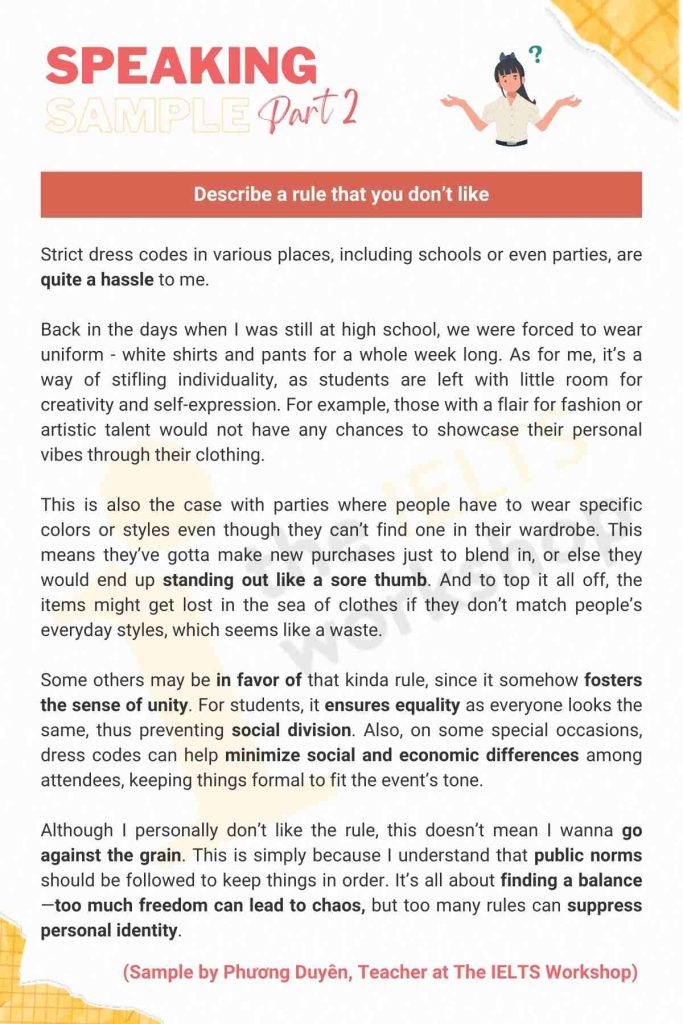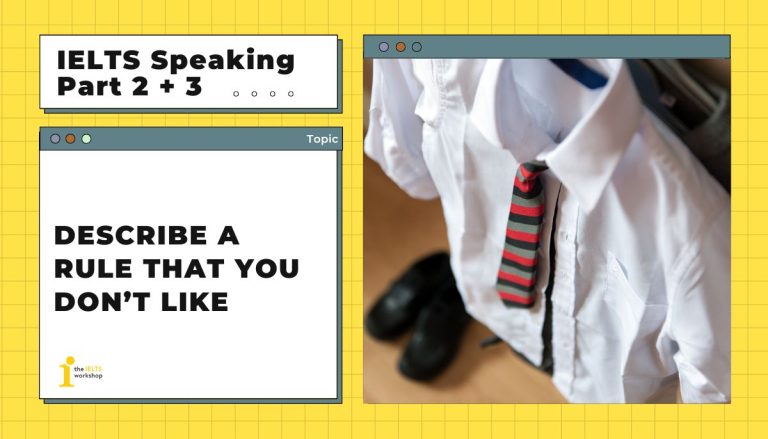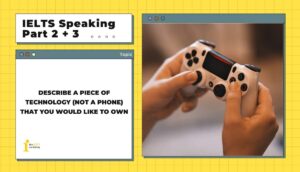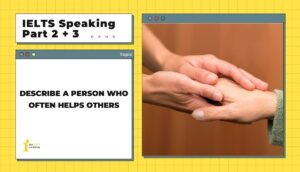Trong bài giải mẫu lần này, cô Phương Duyên và thầy Khánh Nam của The IELTS Workshop sẽ hướng dẫn bạn trả lời topic “Describe a rule that you dislike” trong IELTS Speaking Part 2. Cùng tham khảo sample, từ vựng và một vài cách diễn đạt ghi điểm trong phần thi IELTS Speaking nhé.
Part 2: Describe a rule that you dislike
Describe a rule that you dislike
You should say:
What it is?
Why don’t you like it?
How do others feel about the rule?
And explain whether you’ve followed the rule?
Dưới đây là bài mẫu cho topic “Describe a rule that you dislike“.
1. Bài mẫu 1 (Sample 1)
Sample

Từ vựng (Vocabulary)
- Quite a hassle: Khá rắc rối
- Stand out like a sore thumb: Nổi bật, lạc lõng vì khác với mọi người xung quanh
- In favor of: Ủng hộ
- Fosters the sense of unity: Thúc đẩy cảm giác đoàn kết
- Ensures equality: Đảm bảo sự bình đẳng
- Social division: Phân chia xã hội
- Minimize social and economic differences: Giảm thiểu sự khác biệt xã hội và kinh tế
- Go against the grain: Đi ngược lại với xu hướng
- Public norms: Các quy tắc xã hội
- Finding a balance: Tìm kiếm sự cân bằng
- Too much freedom can lead to chaos: Quá nhiều tự do có thể dẫn đến hỗn loạn
- Suppress personal identity: Kìm hãm bản sắc cá nhân
2. Bài mẫu 2 (Sample 2)
Sample
One rule that does not sit well with me is the one that bans students from bringing food or drinks into the library. As far as I know, this rule is quite common in many schools and universities. It usually applies to all types of food, and sometimes even to water bottles.
Of course, the purpose of this rule is understandable – it’s meant to keep the shared place within the library clean, protect books and electronic equipment from spills, and prevent strong smells or noise that might disturb others. On the surface, it seems reasonable. However, I find it too strict and not very student-friendly, especially during exam season when many students spend hours, even a whole day, studying without leaving the library.
Personally, I don’t think a student eating a small snack or sipping water quietly would cause any harm. In fact, allowing students to have light refreshments can help them stay energized and focused, which improves their productivity. For students who have long study sessions or tight schedules, going outside for a long distance just to grab a quick bite is rather inconvenient and time-consuming.
If I have the authority, I would recommend a more flexible approach to this rule. For example, drinks with secure lids and non-messy snacks like trail mix or granola bars could be permitted. Alternatively, libraries could set up a designated area inside or nearby where students can eat without disturbing others. I reckon that such a change would be more practical for the youth, making the library a more supportive and inclusive learning space.
Sample by Pham Hoang Khanh Nam, IELTS Teacher at The IELTS Workshop
Từ vựng (Vocabulary)
- not sit well with sb: không ổn, khó đồng ý hoặc chấp nhận
- shared place: không gian chung
- spills: đồ uống bị đổ
- light refreshments: đồ ăn nhẹ
- long study session: thời gian, buổi học dài
- tight schedule: lịch trình dày đặc
- grab a quick bite: ăn nhanh, ăn vội
- a more flexible approach: một cách tiệp cận linh hoạt hơn
- secure lids: nắp đậy chặt, an toàn
- trail mix: gói hạt hỗn hợp
- designated area: khu vực riêng
- inclusive learning space: không gian học tập hoà nhập
Part 3:
Bên cạnh Part 2, bạn hãy tham khảo thêm Part 3 cho chủ đề này nhé
- What are the rules students should follow at school?
- Are the rules at school good or bad?
- Do people often violate the rules in Viet Nam?
- What rules should children follow at home?
- Do you know anyone who has broken the law?
- When is it okay to break the rules?
- How are people punished when parking in the wrong spot?
1. What are the rules students should follow at school?
From my point of view, students have to comply with a range of rules when they are at school. First of all, classroom etiquette plays a crucial role. For example, students are told to go to school on time, raise hands before speaking, not do personal work during class and respect their teachers and friends. Another rule students must obey is related to school work. As I see it, learners are encouraged to actively take part in class discussions, turn in their assignments on time and avoid academic dishonesty, such as cheating in exams. All of these pave the way for things to run smoothly, ensure the educational standards and the positive academic outcomes.
- Classroom etiquette: Quy tắc ứng xử trong lớp học
- Running smoothly: Hoạt động trôi chảy
- Fair chance: Cơ hội công bằng
- Educational standards: Tiêu chuẩn giáo dục
2. Are the rules at school good or bad?
As far as I’m concerned, it’s a double-edged sword. On the one hand, there’s no doubt school rules provide structure and order in the classroom, making the environment conducive to learning and teaching. An example can be seen when students are not permitted to look at others’ work or use unauthorized materials in their examinations, making sure that everyone has a level playing field. However, when rules are applied too rigidly, frustration can happen. One-size-fits-all approach to dress codes or classroom behavior may not account for personal or cultural differences. For instance, one may find wearing too short skirts may seem too uncomfortable, but it turns out to be her school’s uniform, placing stress and pressure on students themselves.
- Double-edged sword: Con dao hai lưỡi
- Provide structure and order: Cung cấp cấu trúc và trật tự
- Conducive to learning and teaching: Thuận lợi cho việc học tập và giảng dạy
- Level playing field: sân chơi bình đẳng
- One-size-fits-all approach: Phương pháp áp dụng chung cho tất cả
- Place stress and pressure: Đặt áp lực và căng thẳng
3. Do people often violate the rules in Viet Nam?
From my observation, this happens sometimes, mostly due to unchecked individual temperament going unchecked and lax rule reinforcement. Some students may opt out of the rules because they are not accustomed to following guidelines. This is simply because in some families, there may be little to no parental oversight, leading to the fact that some students may find rules overly restrictive. Another cause comes from the lack of strict reinforcement of the schools’ rule. For instance, in Vietnam, there are some teachers who impose strict rules on when students must hand in their assignment, while others do not. The result is that some students might see the rule as unnecessary, which can result in a disrespect for the policy.
- Unchecked individual temperament: Tính cách cá nhân không được kiểm soát
- Lax rule reinforcement: Công tác thực thi quy tắc lỏng lẻo
- Opt out of the rules: Từ chối tuân theo các quy tắc
- Parental control: Sự kiểm soát của phụ huynh
- Disrespected attitude: Thái độ thiếu tôn trọng
4. What rules should children follow at home?
This varies from home to home, but there are some basic domestic rules that children must adhere to. First of all, there’s no denying that children must look up to their parents without fail. The reason is that without respect, children may not follow parental guidance which plays a vital role in steering them towards the right direction and good behavior. Additionally, curfews also stand out among rules children are required to follow. In some nations, there are strict rules about time, especially when children should return home. From my observation, for their children’s safety reasons, some parents often express concerns about their children’s playtime, worrying that crime or accidents are lurking around every corner, so setting a time limit seems to be beneficial for keeping the children out of trouble.
- Domestic rules: Quy tắc trong gia đình
- Look up to their parents: Tôn trọng cha mẹ
- Steering them towards good behavior: Dẫn dắt họ đến hành vi tốt
- Stand out among rules: Nổi bật trong số các quy tắc
- Lurking around every corner: Rình rập xung quanh mọi góc
5. Do you know anyone who has broken the law?
Yes, I actually knew a classmate back in secondary school who was caught shoplifting from a convenience store. He took some small items like snacks and stationery without paying, probably thinking he could get away with it. However, the store clerk caught him red-handed and called his parents instead of the police, which I thought was quite generous. Although it seemed like a minor incident, it had serious consequences – he was suspended from school for a week and lost the trust of some teachers and classmates.
- shoplifting: ăn cắp vặt
- catch sb red-handed: bắt quả tang ai đó
- generous: hào phóng, rộng lượng
- minor incident: sự việc nhỏ
6. When is it okay to break the rules?
Although rules are generally made to maintain order, there are situations where breaking them can be justified. For example, during emergencies, like when someone needs urgent medical help, a person might run a red light to get the ill to a hospital. In such cases, morality takes precedence over legality. Another example is when people protested against segregation laws that treated Black Americans unfairly. However, said movements should be done with the intention to bring about positive changes, to fight injustice and promote equality.
- urgent medical help: hỗ trợ y tế khẩn cấp
- run a red light: vượt đèn đỏ
- morality: đạo đức
- legality: pháp luật
- protest: biểu tình
- segregation laws: luật phân biệt chủng tộc
- movement: phong trào
7. How are people punished when parking in the wrong spot?
In most cities, people who park in the wrong places may receive a parking ticket, have their vehicle clamped, or even be towed away. These penalties are meant to prevent traffic congestion and keep public spaces organized. For repeat offenders, they could have their driving license points deducted or receive high fines. For example, in Vietnam, parking in restricted zones can lead to fines of several hundred or even up to one million Vietnamese Dong.
- receive a parking ticket: nhận vé phạt
- have one’s vehicle clamped: bị kẹp, khoá xe
- towed away: bị kéo đi
- repeat offenders: người vi phạm nhiều lần, tái phạm
- driving license: bằng lái xe
Sample by Phuong Duyen and Khanh Nam – IELTS Teachers at The IELTS Workshop
Tạm kết
Hy vọng bài mẫu vừa rồi đã giúp bạn hình dung rõ hơn cách triển khai ý và sử dụng ngôn ngữ hiệu quả khi gặp chủ đề Describe a rule that you dislike trong IELTS Speaking Part 2 & 3.
Tham khảo luyện tập thêm nhiều chủ đề khác, đồng thời tham khảo các tài liệu hữu ích như KHO BÀI MẪU IELTS SPEAKING và Bộ đề dự đoán IELTS Speaking Quý 2 (T6 – 08/2025) – Full 3 Parts để nâng cao khả năng phản xạ và mở rộng vốn từ vựng.
Học ngay HỌC IELTS MIỄN PHÍ cùng các giáo viên tại The IELTS Workshop – đăng ký ngay hôm nay nhé!









